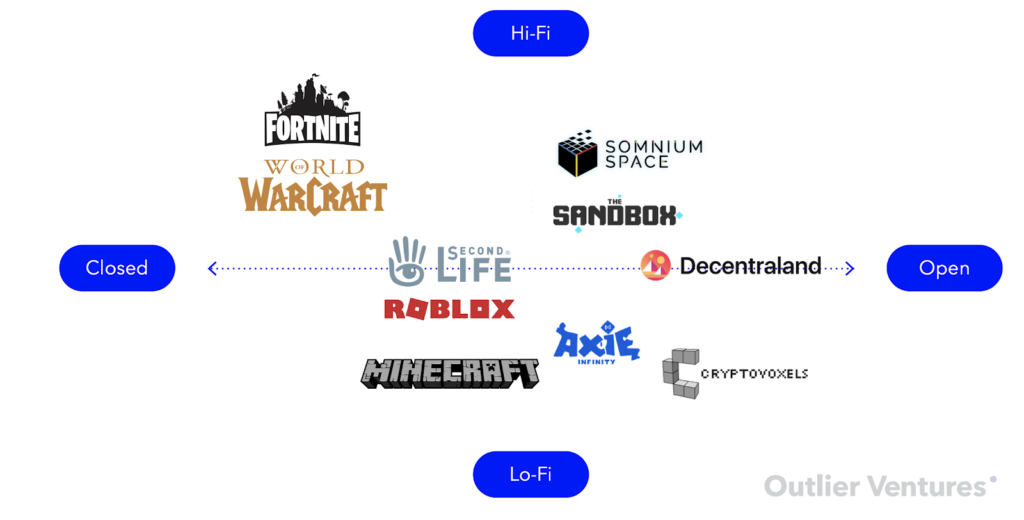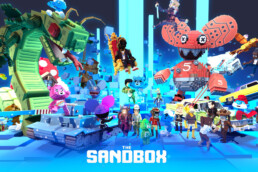The open vs closed debate is one of the most polemic arguments between proponents of the Metaverse.
Is it better to have an open Metaverse where assets built in one world can be freely transferred to another at little or no cost but where the lack of a central authority makes coordination between different software platforms difficult?
Or is it better to have a closed Metaverse where the environment can be better regulated and controlled but the lack of freedom and restrictions imposed by the authority stifles innovation and makes users feel trapped? There’s no right answer to this question but it’s arguably the most important one facing the people and companies building the Metaverse today.
What is an open Metaverse?
An open Metaverse is one where users can build assets and transfer them between different platforms; open metaverse platforms include The Sandbox and Decentraland. Advocates for an open Metaverse believe that leaving its development to a single entity would hand too much power to the entity and leave open the possibility of the Metaverse becoming a dystopian nightmare where one small group can control the lives of billions, much like in Ernest Cline’s novel, Ready Player One.
They believe that the sovereignty of the user and their property should come before that of the platform itself which should act only as an interface for the user to create and live and that users should have the capability to trade assets between themselves without limits.
Open Metaverses offer many other benefits including:
- Allowing users to make worlds more customizable – By making the code available to users, it opens up the possibility that they can improve the Metaverse they currently inhabit or add features to it, much like they can in Linux today as opposed to iOS or Windows. They could even make their own world and create laws that users within it must follow.
- The lack of a central authority – This reduces the likelihood that a bureaucratic institution evolves around the Metaverse, stifling innovation and limiting the power of users. It also makes it impossible for a single authority to shutdown or make massive changes to their Metaverse on a whim with no input from anyone else.
Making the code open source however does expose it to more security risks and the lack of a central authority can make coordination between developers difficult. For these reasons, some believe that a closed Metaverse is preferable to an open one.
What is a closed Metaverse?
A closed Metaverse is one where Metaverses are separated and assets in one world cannot be carried over into another; they are often referred to as walled gardens. Well known examples of such worlds are Roblox and Fortnite.
The most well known supporter of a closed Metaverse is probably Apple. It declined to join the Metaverse Standards forum in June 2022, an organization aimed at industry-wide collaboration on interoperability standards to build an open metaverse. Apple claims it wants to build a world that extends our own rather than creating a world for us to live in that could lead to a dystopian nightmare. This could be either bad actors who intentionally modify the Metaverse to cause harm or because Apple themselves can’t envision the negative consequences the Metaverse may have in the future.
Much like how the developers who built Facebook couldn’t have imagined the impact it would have on mental health today.
The benefits of a closed Metaverse include:
- A more controlled and in theory safer environment – Assuming the creator of the Metaverse is well intentioned they can better regulate what occurs within the world and introduce laws to remove dangerous or harmful activity.
- A more immersive experience – Not allowing users to change the Metaverse allows the designer more creative freedom as they don’t have to worry about users negatively impacting the world they build.
- Faster Iteration – As the world is controlled by a single entity, the entity can build and improve upon existing features without worrying as much about security or following rules specific to that world as they already control the code and rules governing it.
Obviously removing the ability of users to change the world could lower the amount of innovation taking place within the world and may lead to users feeling a lack of freedom.
 How open or closed metaverses are different virtual worlds?
How open or closed metaverses are different virtual worlds?
Which is better? As in Neal Stephenson’s 1992 novel Snow Crash or Ernest Cline’s 2011 novel Ready Player One, the open Metaverse is what most science fiction writers originally envisioned when they wrote about it and what most companies are trying to build today.
Whether you believe the Metaverse should be open or closed is largely a personal opinion and there’s strong arguments on both sides. The contrasting approaches that Meta and The Sandbox take towards Metaverse development show this.
Arthur Madrid, The Sandbox’s CEO believes Meta and The Sandbox have very different approaches and plans for how to build the Metaverse. He said “[Meta] cannot do what we do, It’s an advertising company. It’s gonna be all about getting your names, getting your tastes. What I want to create with Sandbox is very different”.
Although Mark Zuckerburg has probably done more than anyone else to bring the concept of The Metaverse into the public eye, he’s on record as saying that he sees it as another way for Meta to make money from users and that it will take a 47.5% cut of sales on the platform.
The Sandbox meanwhile takes only a 5% fee. The owners of The Sandbox seem to genuinely want to create a Metaverse where users can create in-game items and profit from them whilst having real influence over the direction the platform takes. Meta, however, seems to see the principal reason behind creating the Metaverse as another way for the company to make money and remain relevant as the real and digital worlds begin to overlap even more in the coming years.
Get more insights like this on the business and marketing of the metaverse delivered to your inbox. We’ll never spam you, ever.
Harry Harrison
After spending 3 years traveling around Australia and Asia I began writing about finance whilst stuck at home at the beginning of 2020 thanks to Covid. I've always had a strong interest in business and technology and he thoroughly enjoys learning more about anything connected to the Metaverse, NFTs or crypto. In my spare time he enjoys playing soccer, pool or chess and reading about history, science and technology.
Related Posts
June 14, 2023
How To Successfully Launch Games on Roblox, with Zach Letter of Wonder Works
How can developers successfully launch games on Roblox? In my recent…
May 20, 2023
Branding Success: Guaranteed Engagement in The Sandbox
The Sandbox Metaverse is a really interesting opportunity for branded…
March 7, 2023
Metaverse Marketing – The Emerging Practice
As the digital world continues to evolve, businesses need to stay ahead of the…



